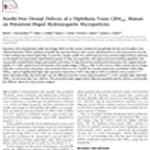The Oxford Martin Programme on
Vaccines

The Oxford Martin Programme on Vaccines was established in 2010 and the grant from the School ended in September 2015. The following page is an archived resource.

the project
The WHO’s World Statistics Report for 2015 shows that more than a quarter of infant deaths are from infectious diseases, and although adult deaths from infectious diseases in the global population are decreasing, they still outrank non-communicable diseases in many poorer nations.
The threat of pandemics and mortality from endemic diseases will continue to pose great challenges for vaccine research and development in coming decades.
The programme aims to design and develop new vaccines against infectious diseases of global health importance, focusing on six key targets: hepatitis, pandemic influenza, malaria, tuberculosis, HIV/AIDS and meningitis.
The Oxford Martin Programme on Vaccines brings together Oxford’s diverse range of vaccines research. The collaboration provides a spectrum of expertise unparalleled elsewhere in academia and it enables researchers to move between groups, sharing valuable new perspectives and insights.
Members of the Oxford Martin Programme on Vaccines were part of the collaboration that developed a new vaccine, Bexsero, to protect against meningitis B. The vaccine is due to become part of the UK’s childhood immunisation scheme in 2015.
Work to stabilise a key component in vaccines against meningococcal disease, enabling them to be stored for months rather than days, has been taken up by Novartis.
Clinical trials are underway into vaccines designed to induce immunity against all types of influenza.
Researchers have developed a new attenuated respiratory virus that could be used as a carrier for vaccines against influenza, dengue and hepatitis C virus.
Novel, needle-free, vaccine delivery routes have been developed by the team and are now at patent application stage.
videos
Oxford London Lecture 2016: Vaccines for Ebola: Tackling a Market Failure
"New and novel technologies for vaccine delivery" with Dr Christine Rollier
"Prevent and protect: vaccines and immune responses" with Prof Adrian Hill
"A ticking time bomb: the infectious threat of antibiotic resistance" with Dame Sally Davies
"Strategies for vaccines for the 21st century" with Prof Susan Lea, Prof Christoph Tang, Prof Jeffrey Almond & Dr Ian Feavers
"Ebola: implications for Africa and understanding future pandemics" with Prof Peter Piot
"In sickness and in health: developing effective and equitable global health systems"
Oxford Literary Festival 2013: Science and the Future
"Pandemics - Can we eliminate major worldwide epidemics?" with Dr Larry Brilliant
How serious is our exposure to dangerous infections?
Can we create vaccines fast enough for a future pandemic?
Vaccines for global health
Vaccines - the cost-effective way of dealing with infectious disease
Vaccines - successes and shortcomings
Developing vaccines to eliminate malaria, tuberculosis and HIV
publications

Needle-Free Dermal Delivery of a Diphtheria Toxin CRM197 Mutant on Potassium-Doped Hydroxyapatite Microparticles

Enzyme from ocean bacteria reveals a unique catalytic cofactor

Engineering of factor H binding protein, a key vaccine antigen for the prevention of meningococcal disease

Pandemics: Our Fears and the Facts

Crash and beyond

Structure of the TatC core of the twin-arginine protein transport system

New adjutant enhances immune response

Vaccinology: A sweet cleft in HIV's armour

Protection against Liver-Stage Malaria

Extended follow-up following a phase 2b randomized trial of the candidate malaria vaccines FP9 ME-TRAP and MVA ME-TRAP among children in Kenya
Keep in touch
If you found this page useful, sign up to our monthly digest of the latest news and events
Subscribe